Bringing Smiles to the Faces of Women in Uganda
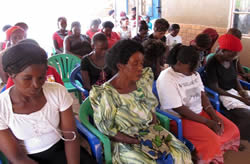
Numerous studies have shown that the Transcendental Meditation technique is an effective way for women to manage stress, to develop a greater sense of fulfillment and inner peace, and improve overall quality of life. Stress can take a serious toll on both body and mind. It can inhibit the flow of creativity and inhibit one’s ability to see oneself in the most positive light. Every human being has the inherent capability to be more creative, happy, and successful in their daily activities.
In developing countries, severe poverty and conflict is the norm for so many women—the challenges wrought by the impact of stress are extremely apparent and have a damaging ripple effect on every aspect of their lives. I had sometimes wondered what effect TM would have on women in such circumstances.
The effect of TM is actually quite profound.
In 2013, Dr. Leslee Goldstein, a Ph.D. candidate at the time at Maharishi University of Management, looked at the effects of TM on a group of Ugandan women living in extreme poverty. The purpose of this study was to explore the effect of TM on self-efficacy, perceived stress, and mental and physical quality of life. The results were so significant that I decided to ask Leslee more about her groundbreaking research.
Helen: First of all, tell me what these women’s lives are like
Leslee: Women in Uganda are among the most impoverished and least empowered in the world with three out of four women living in poverty. The women I was working with live in the village of Nsambya, a slum district of Kampala. They are single mothers, and most are illiterate. They were born and live in poverty. They have very hard lives, a high degree of psychological distress, and very low quality of life. Many of them resort to prostitution in order to survive and take care of their children, to feed and clothe them, and pay for school fees.
Helen: How did your research project come about?
Leslee: These women are served by an organization called the United Women’s Platform for Empowerment Development (UWOPED) run by Brenda Nakalembe. Brenda’s organization provides training programs to help these women improve their lives. The organization has very meager facilities, and much of the work they do is done by gathering groups together in their neighborhoods. They have one very small office, a room with sewing machines that were donated to the organization, and a tent that is used for special meetings with the women. UWOPED’s training programs include sewing, jewelry making, raising animals, growing house gardens and so on.
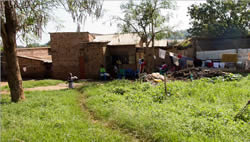
A few years ago, Brenda heard about the Transcendental Meditation technique and decided to ask certified teachers of the African Women and Girls Organization for Total Knowledge-Uganda (AWGOTK)—which is the TM for Women entity in Uganda—to offer TM as one of her training programs. Profoundly inspired by her own personal benefits of the TM technique, Brenda felt that this could be the program to elevate all others. About 60 women learned TM initially with positive results. So, in 2013 when another 80 women expressed interest in learning, I was invited by AWGOTK to implement the research with this group. It was a timely coincidence that I was seeking out a group and they were looking for a research component for this next group of 80 women that they were ready to instruct in TM! It was a great opportunity to evaluate the benefit of the TM practice for women living in these circumstances.
Helen: What improvement were you looking for?
Leslee: When deciding what measures to use I talked to Brenda and deeply considered the challenges faced by these women.
Because UWOPED is an empowerment organization I chose to look at self-efficacy, which is one’s perceived ability to deal with challenges in life. This is a critical element of empowerment. So one of the measures I used was the General Self-efficacy Scale. Questions were answered in light of the common challenges faced by these women, including debt, school fees, confronting death, and being able to feed their children.
These women are facing extremely stressful conditions, and in many cases they exhibit the classic “fight or flight” response, which means that they are often angry and fighting with their neighbors, or they find it difficult to engage with life at all. It has been a challenge for Brenda to find ways to motivate the women to take advantage of her training programs. So in my research I chose to look at perceived stress using the Perceived Stress Scale.
Prior to learning the TM technique these women suffered from fatigue and the inability to think clearly and act efficiently, so I also used subscales of the Medical Outcomes Survey to evaluate mental clarity and physical wellbeing.
Helen: How did you go about testing the women? Were there challenges? You mentioned that most are illiterate and speak Luganda.
Leslee: It really was a great experience—it was amazing how smoothly it all went. I first travelled to Uganda in January of 2013 to do the pretest with 81 women, and then randomly divided them into two groups—the group that learned the TM technique and a control group that learned TM after completing the posttests.
Since the women don’t have phones, or email—they don’t even have electricity, let alone computers— Brenda has a staff member, called a “mobilizer,” who goes door to door and announces the time and place of meetings.
We administered paper and pencil tests that were translated into their language of Luganda, and because the women are illiterate, I trained test administrators to test each person individually. They sat across from the participants and asked them the questions in Luganda and then they recorded their responses.
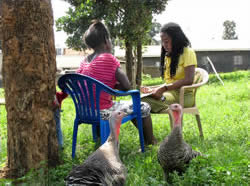
Three months later I returned to administer the post-test. It was reported to me that the lives of these mothers began to transform even from the start—which motivated them to be very regular with their TM practice. Their regularity allowed me to evaluate the benefit of the practice very effectively.
Helen: So tell me about the results?
Leslee: The TM group improved significantly on all measures. Self-efficacy increased, perceived stress decreased, and mental and physical wellbeing improved. The control group showed little to no change on all measures during the posttest. Fortunately, the next day the control group mothers all learned the TM technique.
Even in the beginning, when the mothers first learned TM, you could literally see the change in their faces. During interviews after testing was completed, mothers reported that they felt less stressed, that their families were more harmonious, and that they were getting along better with their neighbors.
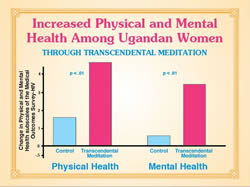
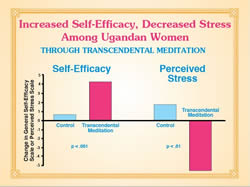
An important impact of this research study was reported by Brenda: she has found that the mothers who have learned TM—because they feel less stress, less anxiety, less anger, and more peaceful inside—are now more eager and ready to participate in all the other programs Brenda offers. So all that Brenda is trying to do to help improve these women’s lives is being enhanced by the introduction of the TM technique. We are all seeing the increased effectiveness that these women are displaying in their daily lives. Many have reported that they now have jobs, or better jobs than they had before.
This study shows that TM is an intervention that can significantly improve self-efficacy. In the course of three months, the women who began the practice became better at dealing with the challenges in their lives, exhibiting greater ability to make choices, take initiative, persevere, and be resilient in the face of obstacles. This is significant, not just for the women in Uganda but for women everywhere. To date, almost 500 members of UWOPED have learned the Transcendental Meditation technique including many children due to word of mouth from one meditating member of UWOPED to the next. The expansion continues under the powerful partnership between the two organizations. It’s a great model for women’s empowerment organizations around the world.
About the Author
Helen Creighton is the national director of TM for Women in Canada.





